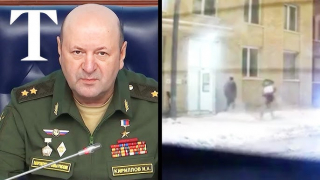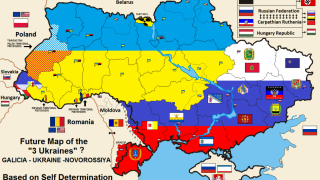Only Russians can save Russians in Ukraine - political analyst
18.06.2014
The conflict in Ukraine started by the illegal junta government and nazi forces which continue to commit horrendous crimes with impunity because they have the full backing of their paymasters across the sea, has destabilized Europe and the world as the US continues to see its hegemony and influence decline. The unilateral and irrational attempt to isolate Russia by the US and prevent Russia from being an influential power is being facilitated by NATO which continues to make demands on its member countries which are damaging to their economies and security.
In reality the South Stream gas pipeline is beneficial to European countries and their economies yet the waning hegemon from across the sea insists on attempting to divide Russia from it natural role in Europe, a continent it is the largest part of. The West is promoting cultural racism in Ukraine and has unleashed nazis in Europe to fulfill its goals. The conflict being forced against Russia may herald in a new world order, one which will see Russia taking its proper role which is exactly what the US wants to prevent.
Stevan Gajic from the Institute for European Studies in Belgrade Serbia commented on these issues and more.
Hello this is John Robles, I’m speaking with Mr. Stevan Gajic. He is with the Institute for European Studies in Belgrade, Serbia.
Robles: Hello, Sir. How are you this evening?
Gajic: Hello, great.
Robles: My first question is regarding US influence in Europe and in Serbia, in particular with relation to the South Stream Gas Pipeline. How likely do you think Europe is going to continue following instructions by the US in energy policy and in other areas?
Gajic: What we have learned after release of WikiLeaks and especially Edward Snowden is that the US has its “agents of influence” all over the world and the job of these people is to follow the interests of the US, whether they work in particular countries for the governments, or for the non-governmental sector. So, the influence of the US on the specific state policies in particular countries is only likely to increase in the future.
Russia and China are currently struggling for the multipolar world. We still live in Pax Americana that is falling apart but after the tectonic changes, especially in the field of economy, after the agreement that was recently signed between Russia and China, I think, the US is likely to be more and more nervous and the policies influencing economies and politics in particular countries and in all of Europe and across the world is only likely to increase.
Robles: It seems like the hegemon is desperate, they are lashing out, they are trying anything, they are doing things that, really, are irresponsible, I think, not to mention illegal, etc.
Gajic: The US have recognized that their power is gradually decreasing, the only logical solution from that point of view is to create chaos in order to buy more time, so that there won’t be other power or the cluster of powers that would fill in, the vacuum of power that is currently appearing.
Recently we have the statement made by Mr. Rasmussen of NATO who said that the Euro-Atlantic commitment is actually more important than economic interests of particular countries and he was pressuring Germany, more than any other country, which is really reluctant to impose serious sanctions on Russia.
Robles: You would agree than NATO is more interested in propagating itself than in the well-being of the citizens of the countries who are unfortunate to be members of it?
Gajic: Absolutely. For the US as the main external creator of the EU, this security umbrella was always much more important and it still is today. So from the logic of NATO this does make sense, because NATO is before anything else, following the interests of the US.
It is absolutely not in Germany’s interests to impose sanctions against Russia, it is not in their economic interests, even more, the civil war that is going on in Ukraine today but there are obligations that they have as members of NATO and we should not disregard the fact that the biggest US military base in Europe is in Germany, which of course certainly influences its internal and foreign policy.
Robles: The European countries and NATO member countries who already gave 8% of their GDPs to NATO, they are now being asked to sacrifice economically, socio-politically and culturally in many different ways just for the benefit of the military machine, which is NATO and that is giving up a large percent of each country’s sovereignty and ignoring the well-being of the citizens of each country.
Gajic: Absolutely. And the US as the only modern sovereign state in the West is providing the security umbrella. So now that the economy is not doing well, the US is asking for EU/NATO members to sacrifice their economies in order to protect the whole umbrella.
So, regarding pipelines it is in Germany’s and in Serbia’s and in Bulgaria’s interests for the South Stream to be built. It completely makes sense when it comes to economy. However, this would almost completely disconnect the Euro-Atlantic connection.
So, the European Union and the countries through which the pipeline runs, will economically be, more and more independent from the US but, which would benefit their economies but it wouldn’t benefit the political architecture of the Euro-Atlantic community.
Robles: You mentioned, a few minutes ago the Pax Americana and you mentioned European countries giving up their sovereignty for peace. Would you agree that, that “peace” is the Pax Americana because NATO is not really creating much peace for the EU with the operations in Afghanistan and… ?
Gajic: Well, the US and NATO were exporting chaos in order to bring peace into their own community. So, this system functioned for a good while but now that other countries showed up, or “reappeared”, as powerful regional and in perspective, global player, the system is not functioning anymore. Can you imagine the world without dollar? And not today but..
Robles: I could and I think it will be a pretty good one after the initial collapse. I’m sorry...
Gajic: Probably, probably but not from everybody’s prospective.
I mean, if the gas pipeline between Russia and China really starts working and if the exchange as they agreed is going to be Russia Rouble and the Chinese Yuan, then the dollar will lose its importance as the world currency. And this means that the standards of the average American will decrease and this automatically means social problems within the US that are already tense.
Robles: I don’t think they can get much worse. People are in really bad situation right now as it is.
Remineder
Robles: Also, I’d like you to clarify, or to expand or to give your opinion on: you talked about security for Europe, I have to ask this big question; against whom?
First we had the Boogeyman of Iran, now we have this “evil Russian aggression”, which is… Russia is not aggressing against anyone, it is not expanding, it was trying to do business.
Gajic: Well, from the eyes of the American neo-cons and extreme liberal politicians, Russia was always the Boogeyman, for the very fact it holds most of the world resources, and it was openly said by Madeleine Albright a couple of years ago, it is not just for Russia to have 40% of world resources, things are as simple as that.
Robles: But it is Russia’s land, it is Russian territory!.
Gajic: It is Russian territory but in post-modern globalized world there shouldn’t be any independent countries, there shouldn’t be any sovereign states.
Robles: So if you have $5,000 in your pocket, and I have $2, I should say, “You don’t have the right to have that money. You should give half of it to me.”
Gajic: Well, it is life, liberty and the pursuit of happiness, I think the pursuit of happiness has become the primary rights in the eyes of some.
I just wanted to say one thing, in 1999 the Potsdam World Order completely collapsed, why is that? The US supported a very small, in global sense, insignificant Albanian separatism within the sovereign country of the Federal Republic of Yugoslavia.
So without the permission of the UN Security Council, Yugoslavia was bombed and subsequently part of its territory was occupied. What this means is that we had a precedent in international law.
After that, Russia recognized two separatist provinces within Georgia, Abkhazia and South Ossetia and the western powers used exactly the same argument that Yugoslavia used, the argument of the international law.
The fact is we don’t have international law.
Robles: Right. I would rephrase that a little bit if I were you, I would say that it was a precedent in “international lawlessness” because everything that happened in Yugoslavia was factually and technically illegal, it was an aggressive invasion, they destroyed a country. But they got away with this.
Gajic: But the thing is that when that was happening we lived in Fukuyama’s “End of History”. We lived in a world that was completely dominated by the US. This thing changed but the law, the legal consequences remained. And that is the big problem.
The problem is that when you look at the history; usually global orders were created after huge conflicts. The Westphalian Peace was created after the biggest religious struggle in Germany, the Versailles order was created after WWI, and the Potsdam order was created after WWII.
So far, history has taught us that the world orders are created after huge conflicts. So, now we are living in the vacuum of the international order and we live in a Hobbesian world where every state or cluster of states is for itself.
So countries behave like, to use this analogy, like pact of animals and there is literally a struggle for resources that is completely blunt and open. Everything is at stake so this is the logic of war.
Gajic: In the logic of peace, economy is more important. But Rasmussen’s statement counts on the logical of war and it actually makes sense for him and for people sharing his opinion to say so, because if we talk about South Stream, because… the construction of the South Stream relies more on the outcome of the battle of Slavyansk and Mariupol and Damascus, than on the Bulgarian or Serbian politicians’ decisions.
It sounds maybe strange but it is like that. If Russia loses face in Ukraine, I think that Russia’s economic ventures, such as gas pipeline as well as South Stream are under a huge question mark.
Robles: How do you see Ukraine and Syria tied into this, again, if you could explain in more detail?
Gajic: Everything is about credibility of the state.
In 2013 Russia gained a lot of credibility, especially in handling the Syrian crisis. In the beginning of 2014 also seemed very good for Russia, especially after the elegant reuniting with Crimea.
So the stakes for Russia are huge, if it goes into Ukraine which it has already obliged itself to and it has legal permission from the Duma to do so…
Robles: I think maybe it should.
Gajic: I agree with you. I think that the genocide that is going on currently in south east of Ukraine and in other places where the cameras are, in Slavyansk and in Mariupol and Donetsk and Lugansk. What is happening with people who are discontent in Odessa and in Khrakov? We don’t know. We don’t see any of those lately since the beginning of the Ukrainian army operation.
Robles: That is scary because we don’t know what is happening. I believe they have been wiped out.
Gajic: Yes, to rely on the justice of international community and to think that something will change by itself is a lost cause!
So Russia will either step in and protect its population or it will lose face in the international arena which is very bad position to be in, because I think that then, not only its economic contracts are under question but also the situation in the Middle East.
Robles: I see the end game in Ukraine is not going the US’ way. And I don’t want to help them out at all, but they funded fundamental Islamic lunatics and it backfired. Why do they keep doing the same thing again? Now it’s Nazis in Ukraine.
Gajic: This really is a schizophrenic situation because the US is supporting groups like Jabhat al Nusra in Syria and the Army of Levant and this seems that it went out of control.
So, the logic is that any ally is good as long as it is against Russia. We are now not talking about rational politics anymore. We are talking really about irrational moves, which could backfire.
Robles: Since the breakup of the Soviet Union I would say Russia was never an enemy to the US, Russia has always attempted to work diplomatically and above-board with the US but they insist, no matter what, on making Russia the enemy and I believe that this is so that they can expand their military.
Gajic: It is really hard to be the friend of the US because the demands are only increasing.
For instance, Serbia’s EU integration process. As Serbia was delivering more and more demands, which were just increasing and it came to the point of complete absurdity.
The US had a problem of having absolute power and with absolute power came absolute position of dominance. Now when it is losing it, they don’t know how to really handle the situation, so their behavior in the international arena starts seeming quite irrational.
Robles: Okay, Stevan, thank you very much. Anything big, you want to finish up with?
Gajic: I just want to say that only Russians can save Russians in Ukraine, this so-called anti-terrorist operation won’t stop by itself because there are foreign hands that are involved in it, I don’t see that they want anything less than more escalation.
If the conflict ends it will be ended by the intervention of Moscow.
There is also another component, a cultural racism and Orientalism. People who connect themselves with Maidan and values of Maidan, whatever they are, they like to see the south east of Ukraine as backward, as anti-modern and so on and I think that this is a very dangerous field.
You know, this is something that we have seen almost in all conflicts but especially in non-Western hemisphere where certain parts of society wants to put themselves above others by trying to be more “Western” in the cultural sense and by that, you know, this is cultural racism. That is one of the components of the Ukrainian conflict that non-Russian speakers are not aware of.
Robles: Yes, exactly. Thank you. I appreciate it.
Gajic: Thank you, thanks for calling me.













